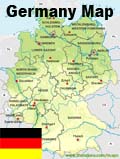Kurd used internet to urge terrorists on: three years jail
 Celle, Germany - In a case with major implications for the internet, a 37-year-old Kurdish father of four who used internet chatrooms to urge fellow Islamists to practice terrorism was jailed Thursday by a German court for three years.
Celle, Germany - In a case with major implications for the internet, a 37-year-old Kurdish father of four who used internet chatrooms to urge fellow Islamists to practice terrorism was jailed Thursday by a German court for three years.
The immigrant's arrest in autumn 2006 in the poor German steel town of Georgsmarienhuette triggered worldwide speculation that police had arrested the chief of an incipient cell in al-Qaeda. The media invaded the town to interview his wife and neighbours.
But the facts presented in court proved less dramatic and showed a man acting like millions of bloggers and chatroom denizens worldwide, typing out messages alone in their rooms while unwitting wives do the housekeeping and children play.
On the internet, the unemployed man found video files of militant Islamist sermons and text files of speeches, full of hate and glorifying terrorism. The preachers appealed to Muslims to volunteer for a jihad or holy war against all infidels.
The accused posted those files or links to them in a chatroom named al-Ansar, apparently unaware that police were observing, and added his own comments to speeches by al-Qaeda leaders Osama bin Laden and Ayman al-Zawahiri, describing them as his brothers.
The court in the northern German city of Celle convicted him on 22 counts of recruiting on behalf of a non-German terrorist organization, which is a crime under German law. Defence lawyers had called for the acquittal of the man, who has Iraqi nationality.
Presiding judge Wolfgang Siolek said the verdict sets a legal precedent in Germany, as the first where a person has been jailed for remarks on the internet in support of a foreign terrorist cause.
Klaus Ruether, defence counsel, said afterwards he would appeal all the way to Germany's supreme court if need be, arguing that internet chat was free speech under the German constitution.
The court said the internet postings had the purpose of urging others to join in the jihad, and went well beyond a mere statement of sympathy with al-Qaeda, which would have been protected by free-speech laws and would not have been punishable.
Describing al-Qaeda leaders as his brothers meant he was presenting himself to his readers as "a fanatical and incorrigible soldier for an extremist ideology," the judge said.
An inquiry about him began in early 2005, but no evidence was found that the accused himself was forming a terrorist organization, as first suspected. That part of the inquiry was dropped.
For another year, police observed his internet visits and tapped his telephone.
Since his arrest, he has spent nearly two years in pre-trial custody. He was remanded back into custody Thursday to await his appeal, since judges said he might flee if he were freed on bail.
In Germany's federal justice capital of Karlsruhe, a federal prosecutor, Peter Ernst, said the verdict broke new ground, showing Islamist users of the internet they could no longer say what they liked without being punished. (dpa)